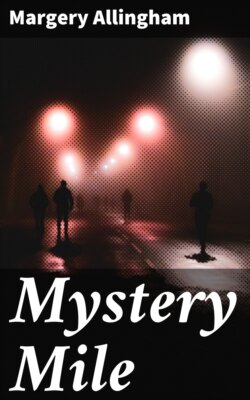Читать книгу Mystery Mile - Margery Allingham - Страница 8
На сайте Литреса книга снята с продажи.
5 The Seven Whistlers
ОглавлениеTable of Contents
The drawing-room at the Dower House, small, cosy, and lined with white panelling, was lit that evening with candles only, and their flickering light was kind to the faded rose tapestry and the India carpet which had once been the pride of a great-great-grandmother of Biddy’s. There was a fire in the old-fashioned grate, and the whole room looked particularly inviting when they came in from dinner.
Swithin Cush and Judge Lobbett were talking enthusiastically as they followed the young people. They had delighted each other with a mutual display of archaeological fireworks all through dinner and were still engrossed in their subject.
The rector had appeared in his Sunday clothes in response to an urgent message from Biddy, and his venerable green-black clerical coat of ancient cut enhanced his patriarchal air.
They had been discussing the Royal Letter which entitled the incumbent of the Mansion to be styled Lord of the Manor. Old Lobbett was deeply interested, and the two elder men bent over the faded parchment, sharing their enthusiasm for the relic.
Biddy and Isopel sat side by side on the high-backed settee while the three younger men talked together on the far side of the fireplace.
‘By the way,’ said Marlowe, ‘we had a visit from a deputation this afternoon. Two old fellows came up to see us, apparently representing the villagers, with an extraordinary yarn about free beer that was apparently doled out at this time of the year. It was something about “Owl Friday”, as far as we could gather.’
Biddy and Giles exchanged glances. ‘I bet that’s George,’ said Giles. ‘Disgusting old cadger!’
‘That’s right,’ said Marlowe. ‘George and a man apparently called “ ’Anry”. But George was the head man.’
Biddy began to apologize. ‘They’re dreadful,’ she said helplessly. ‘They’re inveterate beggars. I hope you sent them away.’
Marlowe shook his head. ‘The old boy rather liked them,’ he said. ‘It showed they were friendly, anyway. They were talking about old customs practically all the afternoon. At least, George was. ’Anry’s comments were unintelligible.’
‘Henry’s a bokel,’ said Biddy. ‘That was father’s word. It means half a barmy, half a yokel.’
After a while the conversation died down and the little party sat in that pleasant silence which is induced by warmth and well-being. And then, from far away over the marshes came a sound, almost lost and diffused in the air—a soft, long-drawn-out whistle.
No one appeared to hear it, but Mr Campion’s pale eyes flickered behind his spectacles, and he shifted slightly in his chair, his ear turned to the window.
Within ten seconds the sound came again, a little nearer, more distinguishable. Still no one spoke in the warm peaceful room, but the atmosphere of security had vanished for one of the party at least. Again the whistle sounded, still far away, but appreciably nearer.
Suddenly Isopel looked up. ‘An owl,’ she said. ‘Did you hear it?’
Giles listened. ‘Yes, there it is again,’ he said. ‘It’s flying this way,’ he added, as the sound was repeated, this time no farther away than the park.
Mr Campion rose and walked over to the window, and it did not escape Biddy that he stood at the side of the sash, so that he could not be seen easily from without. For the sixth time the unearthly sound was repeated.
And then, while they were all listening, a curious sense of apprehension stealing over every one of them, a sudden blood-curdling wail was uttered somewhere within the garden, long-drawn-out like the others, but with a definite quaver in the middle.
‘God bless my soul!’ said Swithin Cush, sitting up suddenly. ‘What was that?’
Mr Campion turned from the window. ‘That, if I am not very much mistaken,’ said he, ‘is a visitor.’
Hardly had the words passed from his lips than a loose wire creaked uneasily somewhere over their heads and the next moment a bell pealed hollowly, echoing noisily over the house.
No one moved or spoke. In the hall outside they heard the sound of feet and the click of the lock as someone opened the door. Then there was a murmur of voices, a soft insidious tone mingled with the strident Suffolk accent. Then the door of the room in which they sat opened and old Cuddy, flustered and excited, appeared on the threshold.
She was a spare, scrupulously tidy old lady, with a round red face and a lot of combs in her scant hair. She wore a black apron over a particularly vivid magenta woollen frock.
She came in, and striding across the room handed Biddy a card on a small brass platter. The girl took it in astonishment, Mr Campion coming up behind her.
She read it aloud:
‘MR ANTHONY DATCHETT, PALMIST’
